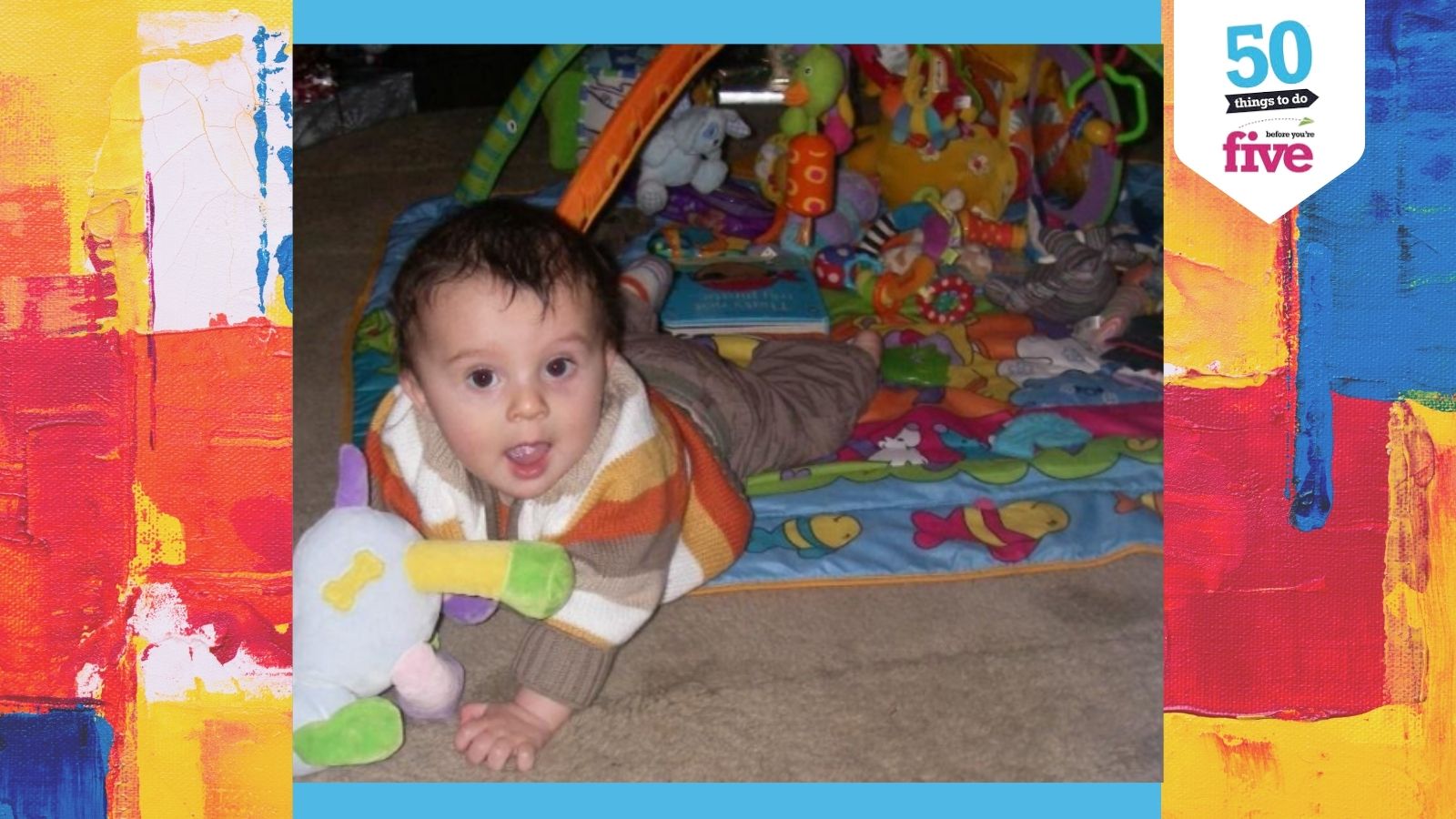How tummy time and head control can help babies develop motor skills
4/1/20

Propping! Look at that head control and shoulder strength.
Nick Preston, Physiotherapist and Health Researcher, discusses the importance of motor skills for early years development.
We all have amazing motor skills
Humans are amazing. All of us. We can walk and talk and climb. We can problem solve and use tools to build things or carry out tasks that would have been beyond our ancestors’ abilities only a couple of hundred years ago. Our motor skills are one reason that we developed a large brain (and head!).
Some of us are born with amazing motor skills. David Beckham can kick a football and land it on a dinner plate 75 metres away, every time; Eliud Kipchoge can run a marathon in less than two hours; and gymnasts can perform the most incredible acts of agility, strength and balance. I always marvel at the non-parallel bars especially!
These sporting stars are especially amazing. Only a few people have motor skills as good as this. Usually, nobody notices the rest of us because we are all so similar (but still amazing!). But some of us do get noticed. We don’t catch things thrown to us very well, or our balance isn’t quite as good as others, or we can’t throw or kick a ball easily or accurately. There is nothing wrong with us, we are just at the wrong end of ability in these skills!
But not being so good with our motor skills can cause us difficulties. Our writing is not very neat, and it takes us more time so it’s hard to keep up in school. We get left out of games in the playground, we can’t ride a bike and we sometimes feel clumsy.
Why do a few children have these difficulties? We don’t know. Can we help children to develop better motor skills? Yes! Even David Beckham spent hours and hours as a child and footballer practicing and improving his motor skills.
I am a physiotherapist who carries out research to find the best ways to help children to develop their motor skills. I believe that the activities in 50 Things are very important for helping children’s development in lots of ways, including their motor skills.
Developing our motor skills – head first!
As a new-born baby, development of your motor skills starts straight away. And it starts with head control! Imagine, after nine months of floating happily in a cosy bath of beautifully warm fluid you are suddenly exposed to what seems an incredible weight – the force of gravity. And your head, almost the size of your tiny body, is so heavy!
But within a few days, babies can move their head from its position of lying – or lolling – to look straight ahead. At the same time, the baby’s arms – pulled to the ground by gravity, also start to come to the middle for the hands to meet. It is already possible for parents to interact and support head control development, for example with ‘Pull to sit’. Look at the difference a few days makes! (when I lower the baby, I always put my hands around the baby, under the armpits so that my fingertips could ‘catch’ the baby’s head and it doesn’t ‘bump’ at the end!). And parents can look into their baby’s face, talk and communicate and interact beautifully (see #1 Get To Know You).
Let them play!
It is children's job in life to explore. Let babies have toys and different objects that rattle, squeak, crunch, whistle, ring, speak, reflect, light up or have different textures. Before you know it, they will be reaching for these objects, exploring and playing with them.
Baby proof the area and room – let them sit and play on mats and rugs, place cushions around the baby, barricade the radiators and fire, ensure electric sockets are protected, and don’t leave the baby on the sofa or a table! But do leave them on the floor to play, to roll (look at this motor control and muscle power!) and to prop, to explore and to work those muscles.
Tummy time!
Tummy time from a few days old is also wonderful for helping a baby to develop their motor skills, pushing up with the arms against gravity and their head’s weight. This is still developing head control but now they are working their arms and starting to develop their upper back, shoulder and shoulder blade muscles and stability. Eventually, they will prefer to be in this position to play and look around, and will always roll to their tummy and prop as soon as you lie them on their back. Changing nappies becomes a real battle! Never leave the baby unattended or to sleep on their tummy, of course.
Motor development develops head to toe – you can’t run before you can walk!
At three months, they will be able to prop on their arms beautifully. This is the importance of head control! As they progress, at six months they will be able to sit with their legs in a ‘circle’ shape, soles of feet together, to play, and in propping and sitting will be able to turn their heads without falling in the opposite direction (see 50 Things activity #3).


Good balance because of great head control!
Now their trunk and hip muscles are learning to stabilise and balance, developing good trunk control and hip muscles ready for the next stage - crawling and then standing, then cruising and then the first steps. Babies need that hip and truck stability first though. This is why I discourage placing children for long periods in the type of seats that prevent this developmental stage.

Long periods in this type of chair prevents the trunk and hip muscles from learning to stabilise and balance.
50 Things activities are really helpful for this development – and fun too!
As the infants grow and develop, the 50 Things activities encourage splashing, hopping, climbing, rolling, kicking up leaves and more. These activities take the motor skills that have been developed so naturally and beautifully and blend them with other wonderfully fun developmental opportunities.
Enjoy! They are great fun for parents too!
Nick Preston
Hi, I am Nick. I am a physiotherapist and health researcher working alongside Born in Bradford researchers and other researchers who are exploring ways to help children in any different ways. When I was asked to help with 50 Things, I was delighted – I love them! I am a proud dad who has always loved playing with my son. As a dad and physiotherapist, I think that these activities are a great way to have fun with our children and help them develop at the same time.
